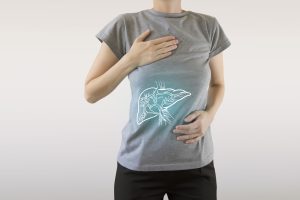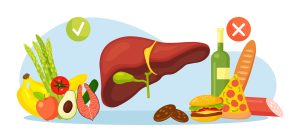Enjoy Holiday Eating Without Overburdening Your Liver


Enjoy Holiday Eating Without Overburdening Your Liver
During the year-end holidays, gatherings with friends and family often involve indulgent feasts, which may unintentionally stress our livers, increase calorie intake, and contribute to post-holiday weight gain. Let’s explore ways to enjoy holiday meals without compromising liver health!
Excessive Alcohol Consumption
The liver processes about 90% of the alcohol we consume. An enzyme in the liver metabolizes alcohol dehydrogenase (ADH) into toxic acetaldehyde, which is then metabolized by acetaldehyde dehydrogenase (ALDH2) into non-toxic acetic acid and excreted with water and carbon dioxide. It takes approximately twelve to twenty-four hours for the liver to break down alcohol. Prolonged and excessive alcohol consumption significantly burdens the liver and can lead to conditions like alcoholic fatty liver, hepatitis, cirrhosis, and even liver cancer.
During gatherings, consider drinking a glass of water for every alcoholic beverage to alleviate alcohol-induced dehydration. Electrolyte-rich beverages like Pocari Sweat can help alleviate hangover symptoms by replenishing lost fluids and diluting alcohol metabolites. Taking vitamin B supplements before meals can boost liver metabolism. Foods high in dietary fiber can slow alcohol absorption thus consuming vegetables during alcohol consumption can prevent fatty liver and reduce liver stress.

Fruits
After indulging in lavish meals and alcohol, we should keep an eye on fruit intake, especially high-glycemic-index fruits, as high sugar content produces triglycerides, worsening fatty liver. Drinking fruit juice or carbonated beverages during gatherings, in moderation, is advised. Opt for tea or water, avoiding sugary drinks to minimize stress on the liver.
Foods good for fatty liver include vegetables and seaweed, which are rich in dietary fiber that can regulate blood sugar spikes. Consider incorporating these into your holiday meals.
Processed Foods
While convenient, processed foods pose health risks due to high fat and salt content. Sausages, fried foods, and other processed items contribute to excess fat intake, elevating the risk of fatty liver. During gatherings, consume these foods in moderation. When preparing meals, opt for low-oil, low-salt, low-sugar, and minimally processed options. Choose cooking methods like boiling, steaming, grilling, and baking over frying to avoid unnecessary saturated fat consumption.
To avoid the harm of processed foods, start with whole foods that are close to their natural state — nutrient-rich and free from artificial additives. Not everyone has time to prepare fresh ingredients and healthy meals, but we can make small daily changes, such as reducing the intake and frequency of processed foods or cooking one meal ourselves each day, in order for health and nutrition.
Unhealthy Lifestyle Habits
Overindulgence, obesity, lack of exercise, and late-night eating negatively impact liver health. Reduce alcohol intake, maintain balanced meals with a focus on vegetables, and avoid going to bed immediately after heavy meals to aid digestion. Sleep is essential for metabolism and physiological functions. Lying down increases blood flow to the liver, supporting cell regeneration and liver function recovery.

Celebrate festivals by making wise dietary choices, engaging in physical activity, and considering supplements based on individual health needs. Walking, climbing stairs, and swimming are excellent exercise options. In addition to workout, choose suitable health supplements to protect the liver and support overall health. Regular health check-ups are crucial to assess liver function. Symptoms of liver diseases may vary, so consult your doctor if you have concerns.

